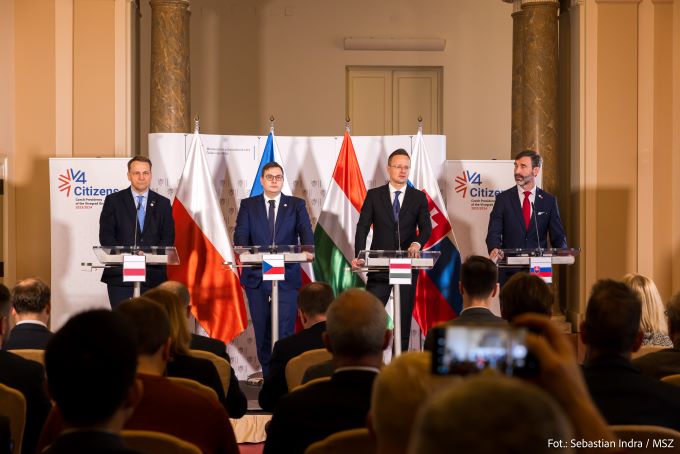On Thursday, March 21, 2024, Foreign Minister Jan Lipavský welcomed his counterparts from the Visegrad Group (V4) countries at the Czernin Palace in Prague. The meeting was held within the framework of the Czech Presidency of the Visegrad Group, which consists of Hungary, Poland, Slovakia, and the Czech Republic. The Foreign Ministers of the Republic of Poland, Radosław Sikorski, Hungary, Péter Szijjártó, and the Slovak Republic, Juraj Blanár, attended the meeting. The ministers held an open discussion on current foreign policy issues, such as Russia’s aggression against Ukraine, the Middle East crisis, and EU enlargement. They unanimously agreed and stated that Russia was responsible for the aggression in Ukraine.
“The Czech Presidency of the Visegrad Group focuses on the positive aspects we have in common – the V4 is primarily a forum for us, where we engage in dialogue and a tool for maintaining and strengthening interpersonal contacts,” Minister Lipavský said.
The four ministers also discussed the beneficial role of the International Visegrad Fund, which has supported cooperation among the citizens of the V4 countries for twenty years. They agreed on a 10 per cent budget increase.
“The budget increase will allow for further cooperation among our citizens and societies,” the Czech minister added.
“#V4 meeting: The discussion was lively and frank which is how I like it because it helps better understand our partners’ position. We respect our respective interests. They are not identical but there are areas in which we can cooperate, for example: agriculture, energy infrastructure, protecting European borders. Thank you @JanLipavsky for hosting us,” Radosław Sikorski posted on X.
Pro-Russians divide the V4 Group
The conflict between Russia and Ukraine has caused a rift within the Visegrád group. The pro-Russian stance of Hungarian Prime Minister Viktor Orbán has caused issues with the other three countries. Slovakian Premier Robert Fico has recently joined Orbán, causing further division within the group. On the other hand, Poland and the Czech Republic have grown closer since the election of Donald Tusk. The V4 Summit, held in February, failed due to disagreements on whether to provide arms to Ukraine to fight against Russia. Hungary and Slovakia, the closest allies of Putin in the EU, opposed the idea, while Poland and the Czech Republic were in support. Hungary has blocked EU sanctions against Russia multiple times, and Orbán met with Vladimir Putin in 2023. Slovakia’s Foreign Minister also met with Russia’s Foreign Minister. Responding to critics, Fico said Slovakia has a balanced and sovereign foreign policy. The foreign Minister of Hungary also informed the V4 meeting about Hungary’s preparations for the Presidency of the Council of the EU. However, Hungary is unlikely to have a significant role during its six-month term.
The Czech Republic and Poland strengthen cooperation
Polish Minister Sikorski visited Prague on March 20 for a two-day meeting with Czech Minister Lipavský. The discussions between the two ministers confirmed that Poland and the Czech Republic share a united stance on several crucial topics. They discussed bilateral relations, regional cooperation, and security concerns in Europe, including the multidimensional support for Ukraine. Both countries have been actively involved in supporting Ukraine since the beginning of the Russian invasion. Minister Sikorski confirmed Poland’s participation in the Czech initiative to procure ammunition for Ukraine. The two ministers also discussed joint efforts to strengthen sanctions against Russia and eliminate any loopholes used to circumvent them.

